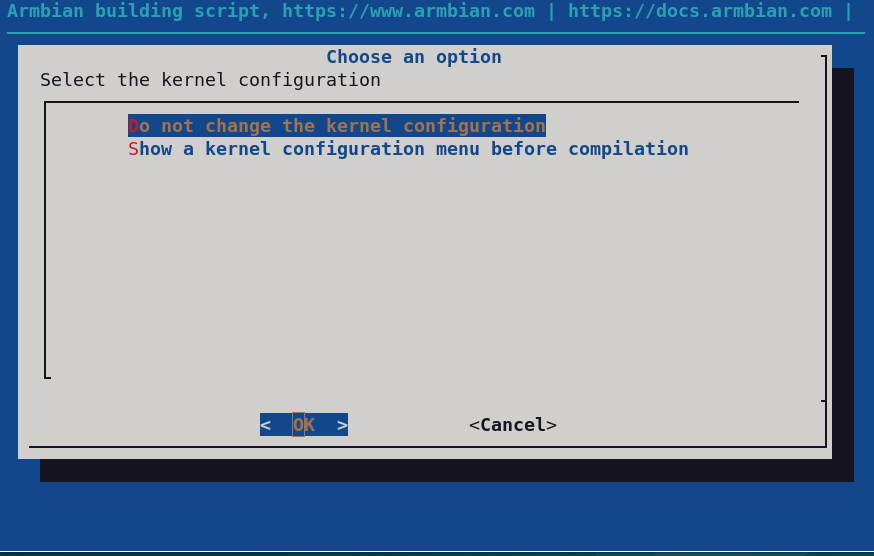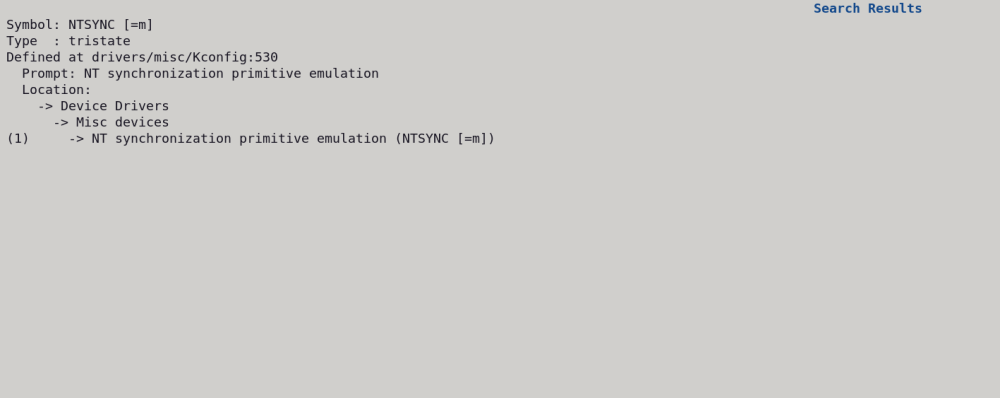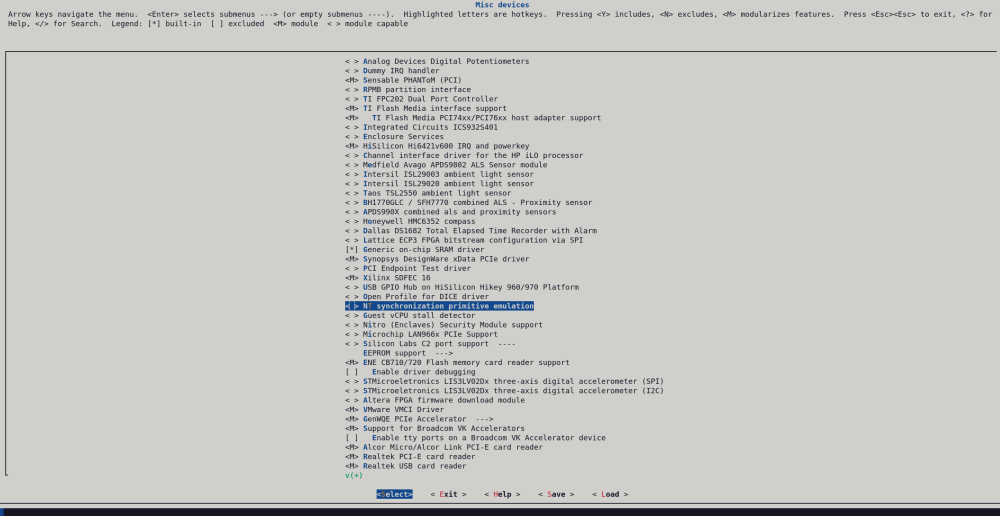All Activity
- Past hour
-
@The Tall Man Thanks again, it works
- Today
-
@The Tall Man Thank you very much, I will try and fb!
-
@Rodrigo Campos@Nick A This guy seems to have created a u-boot that can get 4gb ram for M98-8K. https://github.com/nitrolack/M98-8K-Linux/blob/main/U-Boot Screen 20-03-2024
-
That module is not included in the default kernel build configuration. But you can build the kernel yourself. https://docs.armbian.com/Developer-Guide_Build-Preparation/ https://docs.armbian.com/Developer-Guide_Build-Commands/ When you run ./compile.sh, the first thing it shows you is the kernel configuration screen (image 1). Select, "Show a kernel configuration menu before compilation". When it finally arrives on the configuration menu (image 2), use the forward slash key (/) for search, enter ntsync. When the result comes up (image 3), press 1 to select it. It will take you right to it. It will be highlighted (image 4). Press the M key to select it as a module. The use the right arrow to move from Select to Exit, and keep doing that until you get to where you save it. Then keep going with the rest of the process. I could be wrong about this, but I think you can build the kernel only without the whole armbian image too, with this (from the second link above); ./compile.sh kernel-config BOARD=orangepi5 BRANCH=edge Image 1: Select Kernel Configuration Image 2: Kernel Configuration Menu Image 3: Search Result - NTSYNC Image 4: - NTSYNC Selection
-
As the title says, how can I install the ntsync kernel module for use with Wine/Proton?
-
For anyone interested in solving this temporarily, doing the following steps worked for me: sudo systemctl edit systemd-networkd ### Editing /etc/systemd/system/systemd-networkd.service.d/override.conf ### Anything between here and the comment below will become the new contents of the file [Service] ExecStartPre=/bin/sleep 5 ### Lines below this comment will be discarded sudo systemctl daemon-reexec sudo reboot
-

Rupa X88 Pro 13 - RK3528 board with images
John Taylor replied to fedes_gl's topic in Rockchip CPU Boxes
Guys, please do keep us all updated on the rk3528. I was just about to buy a job lot of boards for a grid computing project when I found it's not supported yet. I found that my old TV rk32xx box was well supported, so am prepared to wait. -
As other people have noted, there are issues trying to connect the CB1 to wifi after the first boot. I believe I've narrowed down the cause, but I'm not sure about the right way to fix it permanently. The issue I was experiencing is as follows: 1. Flash latest armbian minimal to sd card 2. Plug into CB1 and turn it on 3. Go through first boot setup and connect to wifi normally 4. Reboot CB1 5. CB1 no longer connects to wifi, wpa_cli says 'CTRL_EVENT_SCAN_FAILED' A temporary solution I found is to mask systemd-networkd, then manually unmask systemd-networkd and start it after booting. This suggests that the problem is that systemd-networkd tries to talk to the RTL8189 before it's ready, and that puts the chip into a bad state. The wireless connection works on the first boot, because the CB1 doesn't try to configure the chip until after it has booted up. If I only mask netplan-wpa-wlan0 (instead of masking networkd) and try to manually bring it up, then I get an empty scan result, rather than CTRL_EVENT_SCAN_FAILED. Is there a way to make systemd-networkd wait until after the driver has loaded before trying to configure the chip? The easiest temporary solution is probably to just add a delay before systemd-networkd starts.
-
@snow try the transpeed image https://github.com/NickAlilovic/build/releases/tag/20250306
- Yesterday
-
Thanks for the reply. In the end I soved it by following also a few steps from over here. I don't know exactly what did the trick, but actually I assume it was pure coincidence: my ethernet device is actually called en0, not eth0. During my first run through this tutorial I wasn't aware of that. I think I simply forgot to change this bit in my recent try and luckily got it working that way. About the systemd-cryptsetup: I don't know if I understand correctly, but doesn't this do some of the steps automatically which we set up manually? If so, maybe it should be adopted to this tutorial in the future …
-
You could try to write the bootloader again to the SD-card, it seems like it's mixed up. Old with new. not sure if the names are exactly like this but something like this: cd /usr/lib/linux-u-boot-vendor-orangepi-5 sudo dd if=u-boot-rockchip.bin of=/dev/sdx seek=64 conv=fsync sudo sync Or is ls -l /boot to see if the symlinks are correct. The correct dtb in armbianEnv.txt? The correct dtb for your current kernel version?
-
Any direction on where to look/fix?
-
There are three ways to do this. The first simplest is to assemble a binary debian package using the Armbiyan assembly system and then convert it to a rpm package directly in a running OpenSuse OS. The second way is more complicated but it is more correct. You can take patches directly from the build system and apply them to OpenSuse kernel sources in the sequence in which the build system does this while running. Next, build the kernel package using rpmbuild. The third way is the same as the second but use OBS. This will allow you to have your own repository of signed packages and install them using zypper. You can find like-minded people anywhere on our planet, including this place. Hope this helps you.
-

HC4 PWM Fan Control Not Working - Need Guidance to Contribute a Fix
Georges Holland replied to Adrienne's topic in Beginners
Hey, I think I'm impacted by the same issue. I've replaced the original fan of the HC4 with a Noctua NF-A4x10 5V PWM earlier this year. It was working as expected, but since couple weeks the fan is at 100% speed continuously, which is loud. It sounds like it's a software upgrade that broke the PWM control, but no idea which one. I've done part of the same testing you mentioned but didn't managed to find a fix neither. I'm probably even more beginner than you, so I don't think I can help much unfortunately. How can we get more eyes on this issue? Did you post on Odroid Forum? -
OK, so I installed the latest Debian/Trixie + Cinnamon + vendor kernel available and audio is working. The name of the cards and mixers are different though: speaker-test worked both by specifying the mixer (... -D plughw:CARD=rockchiphdmi0,DEV=0) or through PulseAudio's ALSA emulation after setting the default sink to the rockchiphdmi0 card. The list of audio cards is different in the vendor kernel than what's available OOB with the edge kernel, so I'm not sure if the configuration is comparable. But the audio port/cable combo seems to be fine so there's that..
-
Yes, exactly.
-

Motorcomm YT6801 Ethernet Controller
Xorcist replied to Xorcist's topic in UEFI x86 / qemu x86 / arm64
Oh are you saying that the Tuxedo v1.0.30 package works with the latest 6.12.44 headers? I did not try moving ahead to the latest as I didn't see an option to swap to that kernel in armbian-config (only to go back to 6.12.32). My current kernel is 6.12.41 (default install). I assume I can manually update via: sudo apt-get update && apt upgrade -y and then install the headers afterwards. -
I can try it, just to check that the cable/port combo is ok. I'm not sure how would that help - the reason I'm using the edge kernel is to use the upstream/Linux kernel implementation and the implementation may not be the same as the one provided in the outdated vendor image.
-
tl;dr; You need to fix the driver code similar we do it here https://github.com/armbian/build/tree/main/patch/misc I tried this: https://github.com/albertogviana/YT6801 (but tuxedo v1.0.30 might have this already fixed) https://paste.armbian.com/xeraretaxu.diff I fix the most obvious errors, but don't have time to deal with this code. Some intermediate or old kernels might be missing matched headers. They are present at latest kernel (tested). BTW, it works for me: khadas-mind:Downloads:% sudo dpkg -i tuxedo-yt6801_1.0.30tux4_all.deb Selecting previously unselected package tuxedo-yt6801. (Reading database ... 158138 files and directories currently installed.) Preparing to unpack tuxedo-yt6801_1.0.30tux4_all.deb ... Unpacking tuxedo-yt6801 (1.0.30tux4) ... Setting up tuxedo-yt6801 (1.0.30tux4) ... Loading new tuxedo-yt6801-1.0.30tux4 DKMS files... Building for 6.12.44-current-x86 Building initial module for 6.12.44-current-x86 Done. yt6801.ko: Running module version sanity check. - Original module - No original module exists within this kernel - Installation - Installing to /lib/modules/6.12.44-current-x86/updates/dkms/ depmod... (Re)load module if possible khadas-mind:Downloads:% modinfo yt6801 filename: /lib/modules/6.12.44-current-x86/updates/dkms/yt6801.ko license: GPL license: GPL author: Motorcomm Electronic Tech. Co., Ltd. version: 1.0.30 description: Motorcomm YT6801 Gigabit Ethernet Driver srcversion: 13DED66BAFB05DCB4D65DE6 alias: pci:v00001F0Ad00006801sv*sd*bc*sc*i* depends: name: yt6801 retpoline: Y vermagic: 6.12.44-current-x86 SMP preempt mod_unload modversions parm: debug:FUXI ethernet debug level (0=none,...,16=all) (int)
-
I suggest to confirm first that it works with the vendor image, just in case. If you boot the vendor image you could also gather some info, like aplay -L, etc.
-
.thumb.jpg.20ed26dd68aaee94a94b227bf670a8eb.jpg)
support request: NanoPi-R76S
SuperKali replied to Dantes's topic in Framework and userspace feature requests
@Dantes Board is now supported, i advice you to wait next nightly release for fix some issue on cpufreq driver. If experiencing some issue please report on https://forum.armbian.com/forum/85-rockchip/ -

mxq pro 4k 5g allwinner h313 can't sd card boot
Sergey Lepeshkin replied to Ducdanh Nguyen's topic in Allwinner CPU Boxes
@Ducdanh Nguyen, can you contact seller of your tv box and ask if they can provide firmware (or "firmware update") for it? -
This issue isn't for orangepione, but for nanopineo - which I can't find in the dropdowns anymore. Perhaps it is no longer supported. I'm able to build a working image using this command: ./compile.sh BOARD=nanopineo BRANCH=current RELEASE=noble BUILD_MINIMAL=no BUILD_DESKTOP=no KERNEL_CONFIGURE=no COMPRESS_OUTPUTIMAGE=xz However, if I add the CPU governance variables, such as this: ./compile.sh BOARD=nanopineo BRANCH=current RELEASE=noble BUILD_MINIMAL=no BUILD_DESKTOP=no KERNEL_CONFIGURE=no COMPRESS_OUTPUTIMAGE=xz CPUMIN=81600 CPUMAX=96000 ...the build fails with the following error text: ./compile.sh mike [🚸] This script requires root privileges; Docker is unavailable [ trying to use sudo ] [🌿] Applying cmdline param [ 'PREFER_DOCKER': '(unset)' --> 'no' early ] [🌱] Skip cmdline param [ 'ARMBIAN_RELAUNCHED': already set to 'yes' early ] [🌿] Applying cmdline param [ 'SET_OWNER_TO_UID': '(unset)' --> '1000' early ] [🌱] Skip cmdline param [ 'PREFER_DOCKER': already set to 'no' after config 'config-mike.conf' ] [🌱] Skip cmdline param [ 'ARMBIAN_RELAUNCHED': already set to 'yes' after config 'config-mike.conf' ] [🌱] Skip cmdline param [ 'SET_OWNER_TO_UID': already set to '1000' after config 'config-mike.conf' ] [🌱] Starting single build process [ nanopineo ] [🌱] Checking [ basic host setup ] [🌱] Build host OS release [ noble ] [🌱] Build host architecture [ arm64 ] [🌱] Sourcing board configuration [ /home/mike/build/config/boards/nanopineo.csc ] [✅] change-tracking: after sourcing board file config/boards/nanopineo.csc [ BOARDFAMILY='sun8i' ] [✅] change-tracking: after sourcing board file config/boards/nanopineo.csc [ BOOTCONFIG='nanopi_neo_defconfig' ] [✅] change-tracking: after defaulting LINUXFAMILY to BOARDFAMILY [ LINUXFAMILY='sun8i' ] [🌱] Starting main configuration [🌱] Using REVISION from [ main VERSION file: '25.11.0-trunk' ] [🌿] Enabling extension [ armbian-config ] [🌱] Sourcing family configuration [ /home/mike/build/config/sources/families/sun8i.conf ] [🌿] Enabling extension [ sunxi-tools ] [💥] Error 1 occurred in main shell [ at /home/mike/build/lib/functions/configuration/main-config.sh:552 source_family_config_and_arch() --> lib/functions/configuration/main-config.sh:552 do_main_configuration() --> lib/functions/configuration/main-config.sh:291 do_with_logging() --> lib/functions/logging/section-logging.sh:81 do_with_conditional_logging() --> lib/functions/logging/section-logging.sh:111 prep_conf_main_build_single() --> lib/functions/main/config-prepare.sh:29 cli_standard_build_run() --> lib/functions/cli/cli-build.sh:22 armbian_cli_run_command() --> lib/functions/cli/utils-cli.sh:136 cli_entrypoint() --> lib/functions/cli/entrypoint.sh:208 main() --> compile.sh:50 ] I looked at the source_family_config_and_arch() function source, and the file that gets passed into it (/home/mike/build/config/sources/families/sun8i.conf) exists on my box, but something is causing the failure at line 552 anyway. What's strange is that the exact same LINUXFAMILY / BOARDFAMILY is configured in my working command (with all the params passed on the cmdline), like this: 🌱] Sourcing board configuration [ /home/mike/build/config/boards/nanopineo.csc ] [✅] change-tracking: after sourcing board file config/boards/nanopineo.csc [ BOARDFAMILY='sun8i' ] [✅] change-tracking: after sourcing board file config/boards/nanopineo.csc [ BOOTCONFIG='nanopi_neo_defconfig' ] [✅] change-tracking: after defaulting LINUXFAMILY to BOARDFAMILY [ LINUXFAMILY='sun8i' ] [🌱] Starting main configuration [🌱] Using REVISION from [ main VERSION file: '25.11.0-trunk' ] [🌿] Enabling extension [ armbian-config ] [🌱] Sourcing family configuration [ /home/mike/build/config/sources/families/sun8i.conf ] [🌿] Enabling extension [ sunxi-tools ] [✅] change-tracking: after sourcing family config [ KERNEL_MAJOR_MINOR='6.12' ] [✅] change-tracking: after sourcing family config [ LINUXFAMILY='sunxi' # (was: 'sun8i') ] [✅] change-tracking: after sourcing family config [ KERNELPATCHDIR='archive/sunxi-6.12' ] [✅] change-tracking: after sourcing family config [ BOOTBRANCH='tag:v2024.01' ] [✅] change-tracking: after sourcing family config [ BOOTPATCHDIR='u-boot-sunxi' ] [✅] change-tracking: after sourcing family config [ NETWORKING_STACK='network-manager' ] The build/config/sources/families/sun8i.conf file, referenced in the log output, contains a proper CPUMIN and CPUMAX, so I'm not sure why specifying them on the command line blows up the build. # SPDX-License-Identifier: GPL-2.0 # # Copyright (c) 2013-2023 Igor Pecovnik, igor@armbian.com # # This file is a part of the Armbian Build Framework # https://github.com/armbian/build/ # # shellcheck source=config/sources/families/include/sunxi_common.inc source "${BASH_SOURCE%/*}/include/sunxi_common.inc" if [[ -z ${OVERLAY_PREFIX} ]]; then OVERLAY_PREFIX='sun8i-h3' fi [[ -z $CPUMIN ]] && CPUMIN=480000 [[ -z $CPUMAX ]] && CPUMAX=1400000 Any thoughts on what I'm doing wrong?









